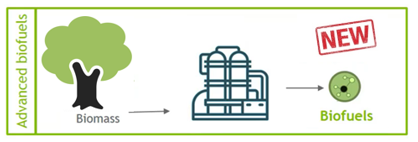Probleemstelling:
One important aspect of a sustainable society is a sustainable transportation system. Unfortunately road transport contributes to 21% of the total carbon dioxide emissions in EU (2017), and is a major contributor to global greenhouse gas emissions. Adapting vehicles and powertrains to become carbon neutral is a pressing issue. One way to achieve this is by exchanging the fossil fuels used today, with biofuels. The utilization of biofuels is a promising short-term solution as they allow formulating so-called “drop-in” fuel blends (fuels with reduced fossil content that work in the currently sold vehicles).
Recently, a novel biorefinery process was developed to efficiently produce a potential advanced second-generation (2G) biofuel blend from woody biomass. 2G biofuels are promising substitutes to fossil fuels as they use feedstock that does not compete with the land use for food production, which is a typical drawback of first-generation biofuels. However, before this new fuel can be accepted as a potential fuel candidate its effect on engine performance and engine emissions has to be evaluated.

